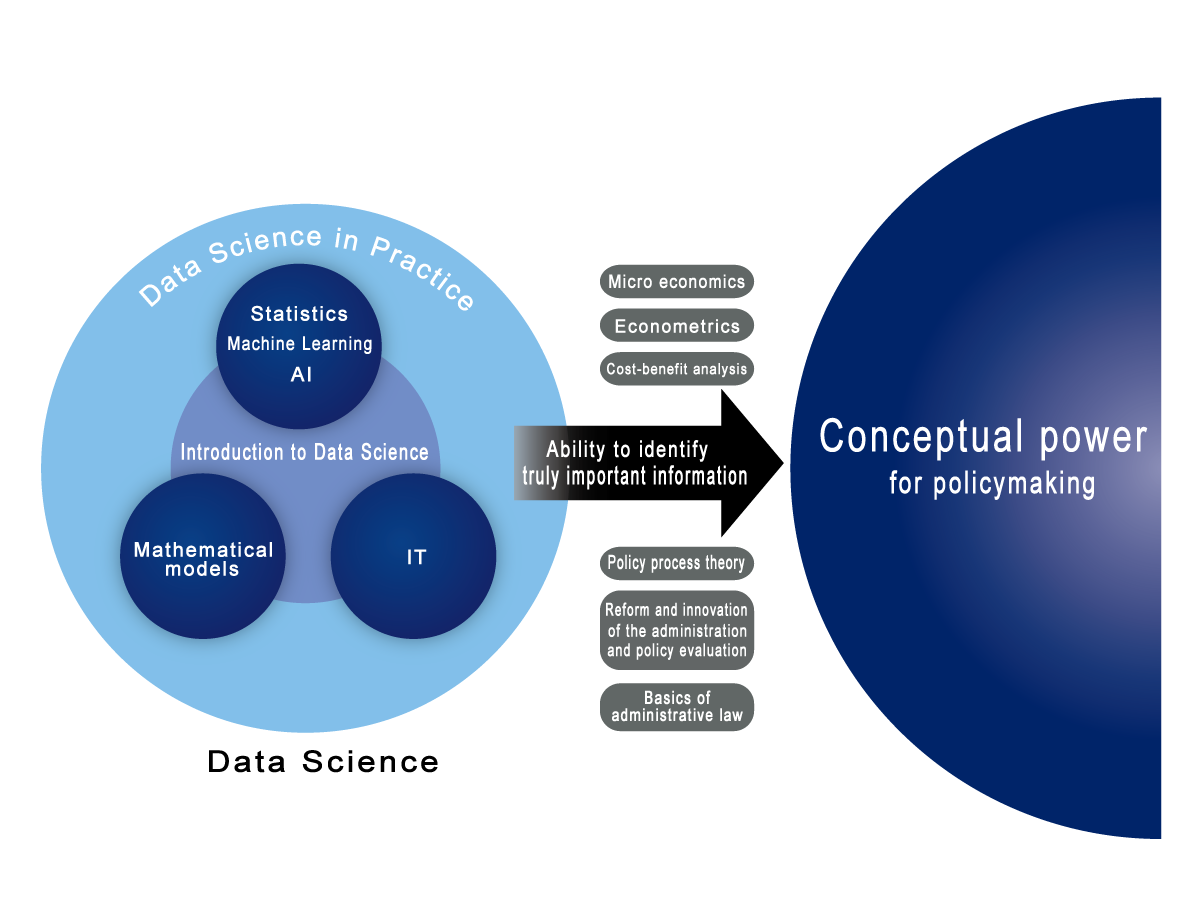1. Objective
Fostering policymakers with data science capabilities
The National Graduate Institute for Policy Studies (GRIPS), in response to increasing interest in data science, launched its data science courses in April 2020. The courses are intended to foster policymakers well equipped for policy work in this new era, reflecting GRIPS’ long history of accomplishments in this area. They provide seamless support, from the basics to actual practice, in order to give the students the skills and knowledge needed to identify truly important information within enormous volumes of data containing a wealth of information, and develop those capabilities into the conceptual power required for contemporary policymaking. These data science courses complement the knowledge that the students acquire through the existing curriculum, which covers a wide variety of fields and disciplines.

2. Target audience
All students studying at GRIPS may take data science courses.
3. Courses

Introduction to Data Science
With regard to the three components of data science, statistics, mathematical models, and IT, students acquire the knowledge necessary for data analysis, starting from the basics. In consideration of the diversity of GRIPS students, around half of the course content consists of exercises, which offers the students as much individual learning support as possible. The students learn about both statistical processing methods and the underlying data collection concepts and IT-based methods, and acquire the literacy necessary to understand the meaning of information derived from data.

Data Science in Practice
In this course category, major data analysis methods currently being employed are selected to allow the students to experience the process of conducting an analysis based on real data, and to acquire practical knowledge and skills. The curriculum includes multivariate analyses, spatial statistics, and machine learning. Students learn to analyze enormous amounts of data, collectively called big data, using R language and other software.
Students can also take the following data science related courses.
<Courses provided in English>
● Introduction to Quantitative Methods
● Quantitative Social Systems Analysis
● Introduction to Applied Econometrics
● Applied Time Series Analysis for Macroeconomics
● Applied Econometrics
● Applied Econometrics Practice
● Time Series Analysis
● Economic Modelling for Policy Simulations
● Computer Programming for Economics
<Courses provided in Japanese>
● Mathematical theory for programming and evaluation
● Mathematical model analysis
● Econometrics
● Application and practice of econometrics
● Spatial analysis of urban policies
Certificate System in Data Science (DS) for Policy Studies
4. Message from the Faculty
Now is the time to learn data science in a developed environment.
The government itself has big data and could become the superlative think tank if it can fully utilize that data. It is urgently necessary to foster human resources who can formulate persuasive policy with foresight, and implement that policy in an easy-to-understand form, using data effectively and making appropriate predictions.
To that end, GRIPS has been reforming its curricula, aiming to enable students to consider and formulate policy based on quantitative grounds and their own analyses of data. Student laptops today have performance equal to that of supercomputers from years ago, and contain free software that can handle data and conduct advanced processing more easily than ever. GRIPS’ training will give students basic knowledge of data science in the spring term, immediately upon entry to classes, in two course categories: "Introduction to Data Science" and "Data Science in Practice." Moreover, students can learn about and benefit from explanations of programming and machine learning from a higher perspective.
5. Main software used
R language, STATA, ArcGIS, Microsoft Office Excel, MATLAB





